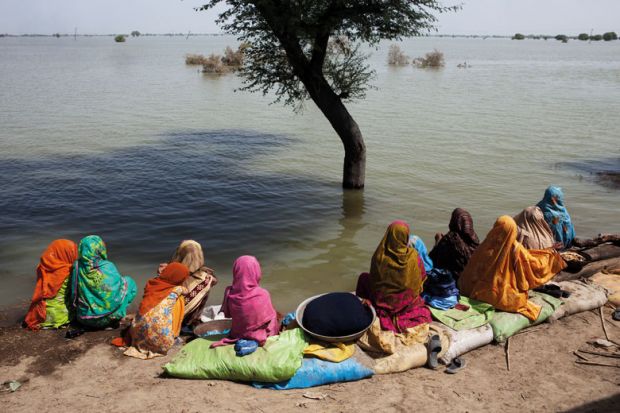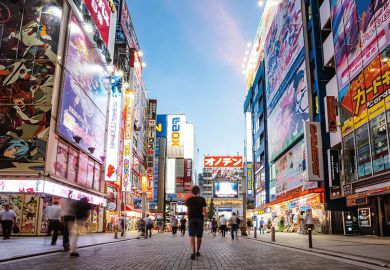Browse the full Impact Rankings 2023 results. To participate in next year’s Impact Rankings, email us
The articulation of the United Nations’ Sustainable Development Goals suggests that the world does not have much faith in the contribution the higher education sector can make, according to Arshad Ahmad.
The vice-chancellor of Lahore University of Management Sciences (LUMS) in Pakistan points out that if you read through the descriptions of the 17 SDGs, the word “university” appears only once. “We want to prove any doubters wrong – to show that in fact we are extremely well positioned and can make a huge difference,” he says.
If one country is on the front line of the climate crisis, the recent flooding that affected a third of its land mass, killed more than 1,700 people and destroyed or damaged 2 million homes suggests that Pakistan is it.
Ahmad, who leads a university with about 5,000 students and 300 faculty, tells Times Higher Education that problem-based learning, research and breaking down silos are all crucial components if universities are to optimise their approach to addressing climate change.
Like most in higher education, he is acutely aware of the importance of collaboration, but he believes that global misperceptions about Pakistan are preventing fruitful partnerships from flourishing.
Interdisciplinary man
Ahmad’s career offers an illustration of the benefits of interdisciplinary working.
As a young student he moved to Canada, where he studied accounting in a bid to please his father. A role as professor of finance at Concordia University in Montreal followed, and he discovered a passion for teaching, but when he told colleagues of his plan to pursue a PhD in educational psychology they were not exactly supportive. “Are you mad? You’ve lost it. You’re in a finance department; this is not going to work. Who’s going to evaluate your work?” he recalls them saying.
He pursued the PhD anyway, at McGill University, and the experience helped form his view on interdisciplinarity – a concept that has not always been as fashionable as it is today. “Structurally, the university has not been designed to incentivise people to learn beyond their discipline, because we are all grouped,” he explains. “We live in a tribe called ‘the discipline’.”
Operating in isolation in this way was not going to solve the world’s biggest problems, Ahmad thought, so when he took the top job at LUMS he established five cross-discipline centres of excellence to champion problem-based learning and research.
One of these, the LUMS Energy Institute, has recently contributed to huge governmental savings, Ahmad explains. “In Pakistan, one of the big elephants in the room – and you won’t see this as much in the headlines – is the crippling impact of the power sector on the economy.”
The sector is weighed down by unsustainable debt, so academics at the Energy Institute created a database that painted a picture of how energy was managed across the nation.
It is, Ahmad says, more comprehensive than the government’s own database. “We have a consortium of universities that are now analysing that data and coming up with some interventions that are what you might call low-hanging fruit.” He says he believes the direct savings as a result of the work could amount to “a billion dollars a year for each of the next 10 years”.
Polluted city
As well as policy interventions, the institute has contributed to practical solutions. Fume-filled traffic jams of motorbikes and rickshaws are common across south Asian cities, but the problem is so bad in Lahore that it has frequently been awarded the dubious accolade of the most polluted city in the world.
A new age of electric vehicles might offer a solution, but even for early adopters in Lahore, adaptations had to be made to suit the local context. Instead of requiring busy drivers to wait while their vehicles charged, LUMS developed swappable electric batteries.
“You basically go to a petrol station, you take out your swappable battery and exchange it for one that is already charged – and then carry on.” The solution, developed in partnership with a South Korean and a US company, has already spawned six spin-off companies.
This is an example of the importance of tailoring solutions to the local context, Ahmad says, adding that it is also crucial to be focused and not try to do everything: “We don’t do research in areas where we are just too far behind, [or] where we don’t have the capacity – stem-cell research, for example.”
Instead of seeing this as a weakness, however, Ahmad points out the impact that practical applications such as the swappable vehicle battery can have in regions in Pakistan and beyond that lack reliable access to electricity: “Imagine the multiplier effect, including on productivity, when we light up all of these rural areas,” he says.
The real front line
To outsiders, the whole of Pakistan might seem as if it is on the front line of the battle against climate change, but Ahmad explains that some regions are more affected than others. To help strengthen such regions and gather vital data, LUMS has begun working with smaller universities in rural areas of the country.
It recently twinned with the University of Baltistan in the foothills of the Himalayas, and ran a collaborative programme focused on sustainability. Each of the two universities brought 150 students and five professors together in Skardu, the town where mountaineers begin their ascent to the legendary peak of K2, to study issues linked to energy, water, entrepreneurship, e-commerce and life sciences.
The rule for this initiative was that classroom-based learning could make up only a quarter of the course. The rest of the time the students and faculty had to be out in the community solving problems.
Ahmad gives the example of a hospital in an area that shut off electricity for 12 hours a day. “Now imagine you’re in an operating theatre and the lights go off. You would think they would have some back-up power – and they do. But it doesn’t always work…which means a patient has to be stitched up again, and everyone has to wait until the power comes on to resume the operation. This is just horrific, isn’t it?”
Through technical upgrades, the collaborative team from the two universities improved the back-up power; now, fewer patients need to undergo stop-start operations.
Useless pieces of paper
If accurate and consistent local data collection is vital to furthering the science of climate change, you might think that universities across the world would be queueing up to work with their peers in Pakistan.
But, in reality, says Ahmad, “not enough of that is happening”. If you randomly selected a dozen vice-chancellors in Pakistan and asked them about their relationships with Western universities, “they would probably tell you: ‘Oh, we have 40 MOUs [memoranda of understanding]. We have a lot of pieces of paper.’”
That is all very well, but “the real deal is about the implementation of an MOU and the interventions that result from it – not an agreement that we will do something,” Ahmad says.
Many in the West hold a misconception that the Global South is “dangerous”, which is a limiting factor on truly meaningful partnerships, Ahmad believes. “I think we really have to put that one to bed. When we say ‘dangerous’, what do we mean? Because if you’re talking about gun violence, I wouldn’t pick Pakistan as the gun capital of the world. I think we have other countries in mind for that. If we talk about danger in terms of living in a city, again there are indices and I will tell you that Lahore ranks as a much safer city than London.”
He blames Western embassies for perpetuating such views through their travel advice: “It’s this barrier that’s been created by embassies warning people, ‘Don’t go there. This is a bad place.’”
As well as affecting attitudes and perspectives, such things also make it much more difficult to organise the practical aspects of student or faculty exchanges. “We really have to clean up these unnecessary, self-imposed boundaries and think more broadly about, you know, what’s good for society; what’s good for climate change; what’s good for the world,” Ahmad argues.
Brain drain
While bureaucracy might hinder the flow of academics coming into Pakistan, plenty of the top minds from the country, and others like it, make their way to wealthy Western universities.
For more than two decades, LUMS has ensured that 10 per cent of its students are from the most deprived economic backgrounds – those with a family income in the region of $200 (£166) a month.
An interesting corollary of this, Ahmad says, is an impact on the brain drain. “I’m finding that the lower the economic stratum of a student, the more they tend to stay [in Pakistan].” This could be because, having received a scholarship to study at LUMS, they want to remain and contribute to the country, whether by starting a social enterprise, working on a community project or just finding employment, he says.
“There’s a huge multiplier effect of bringing in people from low or challenged economic backgrounds, especially if they’re women,” Ahmad says. (Two years ago, LUMS started a generous scholarship programme for all women in its business school. The proportion of women has since risen from 10 per cent to 36 per cent.)
There are, however, still many high-achieving graduates who do leave for opportunities overseas and, unlike the Chinese or Indian diasporas, they are less likely to subsequently return to their home nation. Ahmad thinks the country could do more to attract them back.
As someone who spent more than 40 years in Canada, he can attest to the benefits of returning. “I came back…because, towards the end of your career, when you have experience and something to give back, you can multiply that impact here, like nowhere in the West,” he explains.
“I’ve been here five years. I can tell you that that intuition was correct. I have had the most fulfilling years of my life in the last five years.”
rosa.ellis@timeshighereducation.com
This is part of our “Talking leadership” series with the people running the world’s top universities about how they solve common strategic issues and implement change. Follow the series here.
Register to continue
Why register?
- Registration is free and only takes a moment
- Once registered, you can read 3 articles a month
- Sign up for our newsletter
Subscribe
Or subscribe for unlimited access to:
- Unlimited access to news, views, insights & reviews
- Digital editions
- Digital access to THE’s university and college rankings analysis
Already registered or a current subscriber? Login








